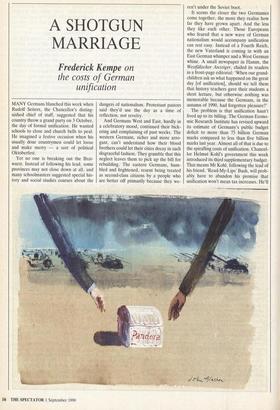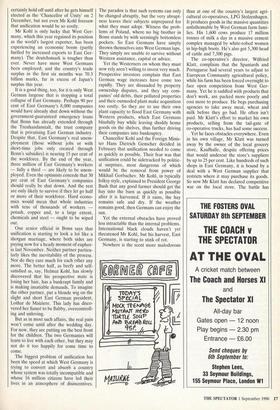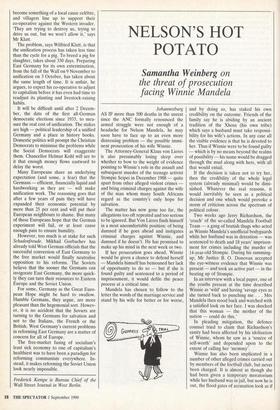A SHOTGUN MARRIAGE
Frederick Kempe on
the costs of German unification
MANY Germans blanched this week when Rudolf Seiters, the Chancellor's disting- uished chief of staff, suggested that his country throw a grand party on 3 October, the day of formal unification. He wanted schools to close and church bells to peal. He imagined a festive occasion when his usually dour countrymen could let loose and make merry — a sort of political Oktoberfest.
Yet no one is breaking out the Brat- wurst. Instead of following his lead, some provinces may not close down at all, and many schoolmasters suggested special his- tory and social studies courses about the dangers of nationalism. Protestant pastors said they'd use the day as a time of reflection, not revelry.
And Germans West and East, hardly in a celebratory mood, continued their bick- ering and complaining of past weeks. The western Germans, richer and more arro- gant, can't understand how their blood brothers could let their cities decay in such disgraceful fashion. They grumble that this neglect leaves them to pick up the bill for rebuilding. The eastern Germans, hum- bled and frightened, resent being treated as second-class citizens by a people who are better off primarily because they we- ren't under the Soviet boot.
It seems the closer the two Germanies come together, the more they realise how far they have grown apart. And the less they like each other. Those Europeans who feared that a new wave of German nationalism would accompany unification can rest easy. Instead of a Fourth Reich, the new Vaterland is coming in with an East German whimper and a West German whine. A small newspaper in Hamm, the Westfalischer Anzeiger, chided its readers in a front-page editorial: 'When our grand- children ask us what happened on the great day [of unification], should we tell them that history teachers gave their students a short lecture, but otherwise nothing was memorable because the Germans, in the autumn of 1990, had forgotten pleasure?'
The problem is that unification hasn't lived up to its billing. The German Econo- mic Research Institute has revised upward its estimate of Germany's public budget deficit to more than 75 billion German marks compared to less than five billion marks last year. Almost all of that is due to the spiralling costs of unification. Chancel- lor Helmut Kohl's government this week introduced its third supplementary budget. That means Mr Kohl, following the lead of his friend, 'Read-My-Lips' Bush, will prob- ably have to abandon his promise that unification won't mean tax increases. He'll certainly hold off until after he gets himself elected as the 'Chancellor of Unity' on 2 December, but not even Mr Kohl foresaw that unification would be so costly.
Mr Kohl is only lucky that West Ger- many, which this year regained its position as the world's largest exporter, has been experiencing an economic boom (partly fuelled by increased exports to East Ger- many). The deutchsmark is tougher than ever. Never have more West Germans been employed; and the country's trade surplus in the first six months was 70.3 billion marks, far in excess of Japan's surplus this year.
It is a good thing, too, for it is only West German largesse that is stopping a total collapse of East Germany. Perhaps 90 per cent of East Germany's 8,000 companies would have already shut down without the government-guaranteed emergency loans that Bonn has already extended through the Treuhandanstalt, the trust company that is privatising East German industry. Despite that, East Germany's real unem- ployment (those without jobs or with short-time jobs only created through Bonn's subsidies) is nearing 15 per cent of the workforce. By the end of the year, three million of East Germany's workers — fully a third — are likely to be unem- ployed. Even the optimists concede that 30 per cent of East Germany's companies should really be shut down. And the rest are only likely to survive if they let go half or more of their workforce. Hard econo- mics would mean that whole industries with tens of thousands of workers potash, copper and, to a large extent, chemicals and steel — ought to be wiped out.
One senior official in Bonn says that unification is starting to look a lot like a shotgun marriage, where both sides are paying now for a heady moment of euphor- ia last November. Neither partner particu- larly likes the inevitability of the process. Nor do they care much for each other any more. The better half, as beefy and self- satisfied as, say, Helmut Kohl, has slowly discovered that his prospective mate is losing her hair, has a bankrupt family and is making insatiable demands. To imagine the other partner, put a blonde wig on the slight and short East German president, Lothar de Maiziere. This lady has disco- vered her fiancé to be flabby, overcontroll- ing and unloving.
But as in most such affairs, the real pain won't come until after the wedding day.
For now, they are putting on the best front for the children. The two Germanies will learn to live with each other, but they may not do it too happily for some time to come.
The biggest problem of unification has been the speed at which West Germany is trying to convert and absorb a country whose system was totally incompatible and whose 16 million citizens have led their lives in an atmosphere of disincentives. The paradox is that such systems can only be changed abruptly, but the very abrupt- ness leaves their subjects unprepared for what they must adopt. Witness the prob- lems of Poland, where no big brother in Bonn stands by with seemingly bottomless pockets. So East Germans have simply thrown themselves into West German laps. They simply are unable to survive without Western assistance, capital or advice.
Yet the Westerners on whom they must now rely aren't willing to invest very much. Prospective investors complain that East German wage increases have come too rapidly. They are dissuaded by property ownership disputes, and they say com- panies' old debts, their polluted properties and their outmoded plant make acquisition too costly. So they are to use their own plant capacity to flood East Germany with Western products, which East Germans blissfully buy while leaving shoddy home goods on the shelves, thus further driving their companies into bankruptcy.
Chancellor Kohl and the Foreign Minis- ter Hans Dietrich Genscher decided in February that unification needed to come as quickly as possible. Their fear was that unification could be sidetracked by politic- al surprises, most dangerous of which would be the removal from power of Mikhail Gorbachev. Mr Kohl, in typically folksy style, explained to President George Bush that any good farmer should get the hay into the barn as quickly as possible after it is harvested. If it rains, the hay remains safe and dry. If the weather remains good, then Germans can enjoy the sun.
Yet the external obstacles have proved less intractable than the internal problems. International black clouds haven't yet threatened Mr Kohl, but his harvest, East Germany, is starting to stink of rot.
Nowhere is the scent more malodorous than at one of the country's largest agri- cultural co-operatives, LPG Stolzenhagen. It produces goods in the massive quantities unfathomable by West German farm fami- lies. His 1,600 cows produce 17 million tonnes of milk a day in a massive cement complex managed by white-robed women in hip-high boots. He's also got 5,300 head of cattle and 7,500 pigs.
The co-operative's director, Wilfried Klatt, complains that the Spaniards and Portuguese had several years to adjust to European Community agricultural policy, while his farm has been forced overnight to face open competition from West Ger- many. Yet he is saddled with products that don't work, are packed more poorly and cost more to produce. He begs purchasing agencies to take away meat, wheat and milk before they go bad. He often isn't paid. Mr Klatt's effort to market his own products, selling from the tail-gate of co-operative trucks, has had some success.
Yet he faces obstacles everywhere. Even in his own village, Mr Klatt was turned away by the owner of the local grocery store, Kaufhalle, despite offering prices that would undercut the store's suppliers by up to 25 per cent. Like hundreds of such shops in East Germany, it is bound by a deal with a West German supplier that restricts where it may purchase its goods. So now Mr Klatt has declared competitive war on the local store. The battle has become something of a local cause celebre, and villagers line up to support their co-operative against the Western invader. `They are trying to destroy us, trying to drive us out, but we won't allow it,' says Mr Klatt.
The problem, says Wilfried Klatt, is that the unification process has taken less time than the cycle for a pig. To breed a pig for slaughter, takes about 330 days. Preparing East Germany for its own extermination, from the fall of the Wall on 9 November to unification on 3 October, has taken about the same length of time. It is unfair, he argues, to expect his co-operative to adjust to capitalism before it has even had time to readjust its planting and livestock-raising habits.
It will be difficult until after 2 Decem- ber, the date of the first all-German democratic elections since 1933, to mea- sure the real cost of unification. The stakes are high — political leadership of a unified Germany and a place in history books.
Domestic politics will prompt the Christian Democrats to minimise the problems while the Social Democrats will exaggerate them. Chancellor Helmut Kohl will see to it that enough money flows eastward to delay the worst.
Many Europeans share an underlying expectation (and some, a fear) that the Germans — efficient, financially liquid and hardworking as they are — will make unification work. The reasoning goes that after a few years of pain they will have expanded their economic potential by more than 25 per cent and will put their European neighbours to shame. But many of these Europeans hope that the German experiment will fail, or at least cause enough pain to ensure humility.
However, too much is at stake for such Schadenfreude. Mikhail Gorbachev has already told West German officials that the successful conversion of East Germany to the free market would finally neutralise opposition to his reforms. The Soviets believe that the sooner the Germans can invigorate East Germany, the more quick- ly they can turn their resources to Eastern Europe and the Soviet Union.
For some, Germany as the Great Euro- pean Hope might be hard to swallow.
Humble Germans, they argue, are more pleasant than the hegemonial sort. Howev- er, it is no accident that the Soviets are turning to the Germans for salvation and not to the Italians, the French or the British. West Germany's current problems in reforming East Germany are a matter of concern for all of Europe.
The free-market fusing of socialism's least sick economy to one of capitalism's healthiest was to have been a paradigm for reforming communism everywhere. In- stead, it makes reforming the Soviet Union look nearly impossible.
Frederick Kempe is Bureau Chief of the Wall Street Journal in West Berlin.




















































 Previous page
Previous page